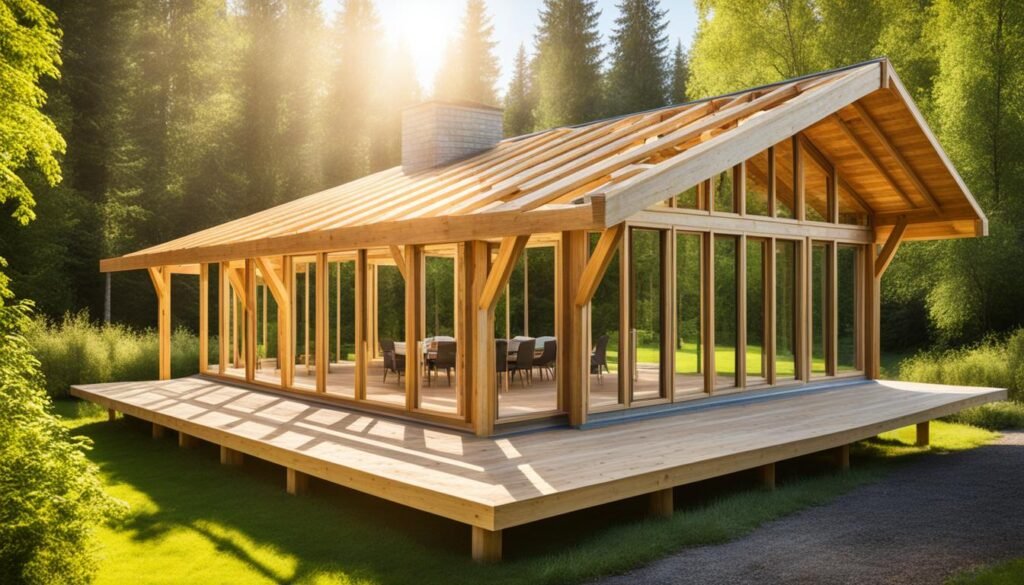Did you know that building with concrete masonry units (CMUs) can actually be cheaper than building with wood in some markets? With the recent surge in lumber prices due to supply chain bottlenecks, the cost of wood has significantly increased, making concrete construction more competitive in terms of cost. This unexpected fact highlights the potential cost savings and benefits of choosing concrete over wood for your construction projects.
- Concrete masonry construction can be cheaper than building with wood in certain markets.
- Building with concrete offers long-term savings opportunities, including lower insurance premiums and reduced risk of mold or water damage.
- Wood construction has its own advantages, such as faster construction time and easier remodeling.
- Concrete construction is more resistant to moisture and offers energy efficiency benefits.
- Consider the specific factors, such as materials, location, features, and slope, when comparing the cost of decks and patios.
Benefits of Wood Construction
When it comes to construction, wood frame homes offer numerous advantages that make them a popular choice. Let’s explore the pros of wood construction:
“Wood frame homes have several advantages, including a faster construction process due to the lightweight nature of wood. This results in a quicker turnaround time and potentially lower expenses.”
One of the key benefits of wood construction is its cost-effectiveness. The lightweight nature of wood allows for a quicker construction process, reducing labor and material costs. This makes wood frame homes a cost-effective option for homeowners and builders alike.
Additionally, wood homes are easier to remodel compared to concrete structures. The versatility of wood enables homeowners to easily make changes or additions to their homes, allowing for greater flexibility and customization.
Wood construction also offers durability against certain elements. Wood frame homes are naturally resistant to termite damage, thanks to the inherent properties of wood that deter termites from infesting the structure. Moreover, wood is also resistant to moisture, reducing the risk of water damage and associated problems such as mold and rot.
With these benefits, it’s clear why wood construction remains a popular choice for homeowners and builders. Whether it’s the quicker turnaround time, cost-effectiveness, ease of remodeling, or resistance to termites and moisture, wood frame homes provide a reliable and desirable option for creating lasting and beautiful structures.

| Benefits of Wood Construction | Description |
|---|---|
| Quicker Turnaround Time | Due to the lightweight nature of wood, the construction process is faster, resulting in quicker completion times. |
| Cost-Effective | Wood construction is generally more affordable compared to other building materials, helping to save on upfront costs. |
| Easier to Remodel | Wood homes offer greater flexibility for remodeling, allowing homeowners to make changes easily and customize their spaces. |
| Termite Resistant | Wood frame homes are naturally resistant to termite damage, protecting the structure from potential infestations. |
| Resistant to Moisture | Wood is naturally resistant to moisture, reducing the risk of water damage, mold, and rot. |
Benefits of Concrete Construction
When considering the advantages of different construction materials, concrete stands out as a reliable and durable option. Concrete homes offer several benefits that make them a popular choice for many homeowners.
- Resistance to Moisture: Concrete structures have superior resistance to moisture, making them less susceptible to water damage compared to wooden buildings. This quality ensures that concrete homes have a longer lifespan and require fewer repairs related to moisture-related issues.
- Energy Efficiency: Concrete is known for its excellent thermal mass properties, which means it can absorb, store, and release heat efficiently. This results in more energy-efficient homes that require less heating and cooling, ultimately saving homeowners on energy bills and reducing their environmental footprint.
- Healthier Indoor Environment: Concrete homes create a healthier indoor environment due to their resistance to mold, mildew, and other harmful microorganisms. This aspect is particularly important for individuals with allergies or respiratory conditions, as it helps maintain a cleaner and safer living space.
Concrete homes offer superior resistance to moisture, more energy efficiency, and a healthier indoor environment compared to wooden structures.
However, it’s important to note that concrete construction can be more expensive and time-consuming compared to wood construction. The longer building process may require more planning and coordination. Additionally, the cost of materials, labor, and specialized equipment for concrete construction can make it less cost-effective upfront.
In summary, concrete construction offers many advantages in terms of durability, energy efficiency, and indoor health. However, it’s crucial for homeowners to consider their specific needs, budget, and timeline when choosing between wood and concrete construction. Consulting with a professional contractor, such as Local Roofer Pros, can provide valuable insights and guidance in making the right decision for your home.

Cost Comparison of Decks and Patios
When considering adding an outdoor space to your home, one of the main factors to consider is cost. The cost of decks and patios can vary depending on several factors.
Firstly, the materials used can significantly impact the price. Decks are typically constructed using wood, which may require regular maintenance and treatment to protect against weather damage. On the other hand, patios are commonly made of concrete, which is generally more affordable and requires minimal upkeep.
Another consideration is the location, features, and size of the addition. If your yard has a slope, constructing a deck might be a more suitable option as it can be built on uneven surfaces. Meanwhile, patios are ideal for level ground. The installation difficulty varies for each option, with decks usually requiring more labor and professional assistance.
Furthermore, the cost of installation should be factored into your decision-making process. While patios are generally cheaper to install upfront, the overall costs may vary depending on the specific requirements of your project. It’s recommended to consult with professionals, such as Local Roofer Pros, to get accurate estimates for your unique circumstances.
Lastly, it’s essential to consider both maintenance and return on investment. Decks often require regular staining, sealing, and repairs, which can add to the long-term costs. Patios, being made of concrete, are more durable and may offer a higher return on investment over time.
FAQ
Is brick cheaper than wood?
It depends on the market. In some areas where lumber prices have surged due to supply chain issues, concrete masonry construction can be cheaper than building with wood.
How does the cost of brick compare to wood?
The cost difference between brick and wood varies depending on factors such as location and market conditions. While brick construction can offer long-term savings opportunities, wood frame homes may have a faster construction process.
What are the advantages of wood construction?
Wood frame homes have advantages such as a quicker turnaround time and easier remodeling capabilities.
Are there any drawbacks to wood frame homes?
Wood frame homes are more susceptible to termite problems and moisture damage compared to concrete structures.
What are the benefits of concrete construction?
Concrete homes offer superior resistance to moisture, making them less prone to water damage. They are also more energy-efficient and promote a healthier indoor environment due to their resistance to mold and other harmful microorganisms.
Are there any downsides to concrete construction?
Concrete construction can be more expensive and time-consuming compared to wood construction.
Which is cheaper to install, a deck or a patio?
Generally, a concrete patio is cheaper to install compared to a wood deck. However, the specific costs depend on various factors such as materials, location, features, size, and the slope of the yard.
What should I consider when deciding between a deck and a patio?
Besides cost, factors such as installation difficulty, maintenance requirements, and potential return on investment should also be considered when deciding between a deck and a patio.
